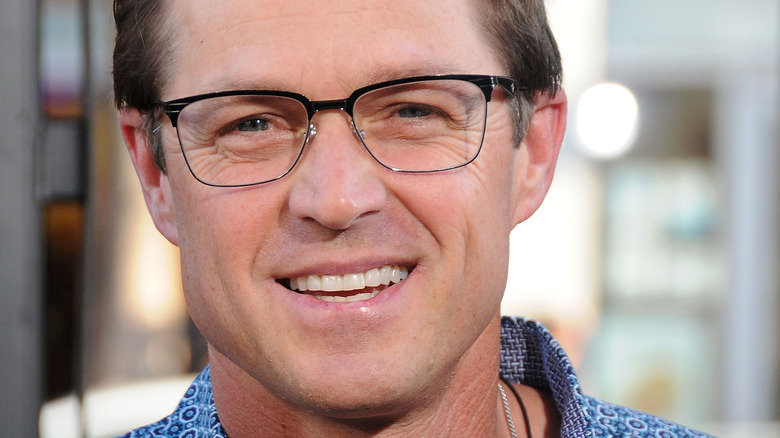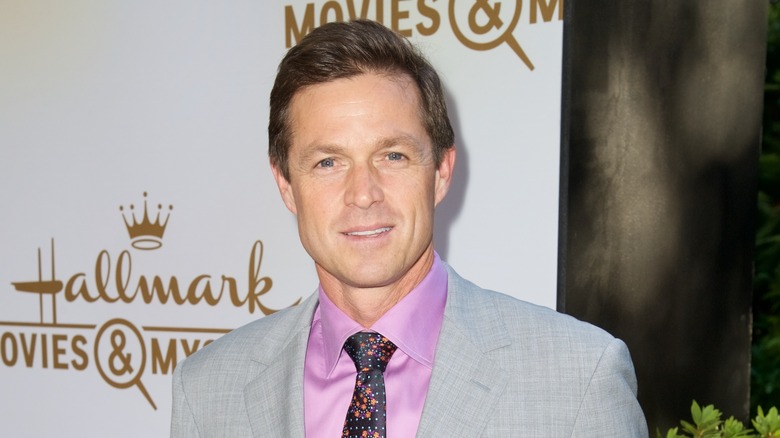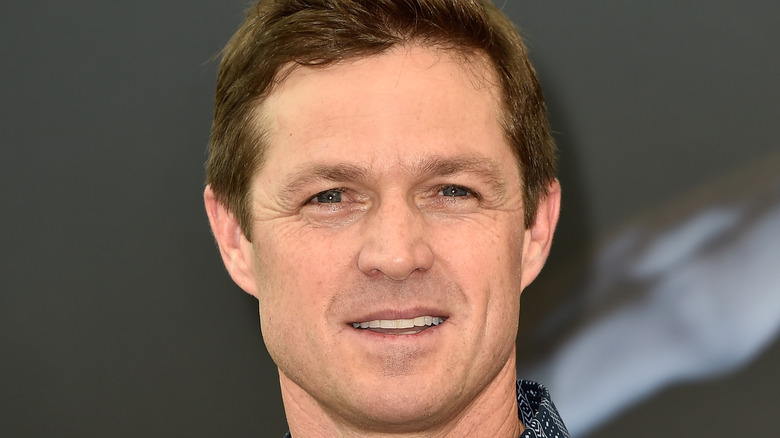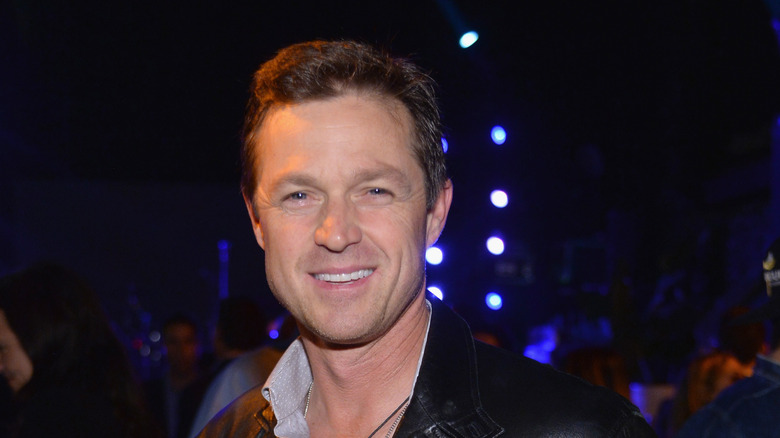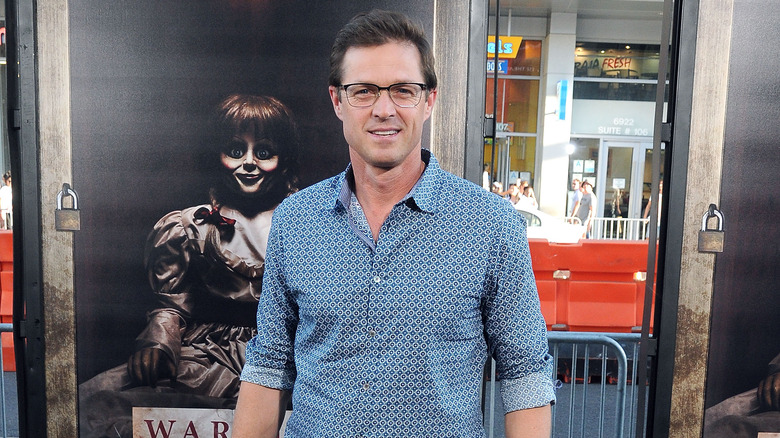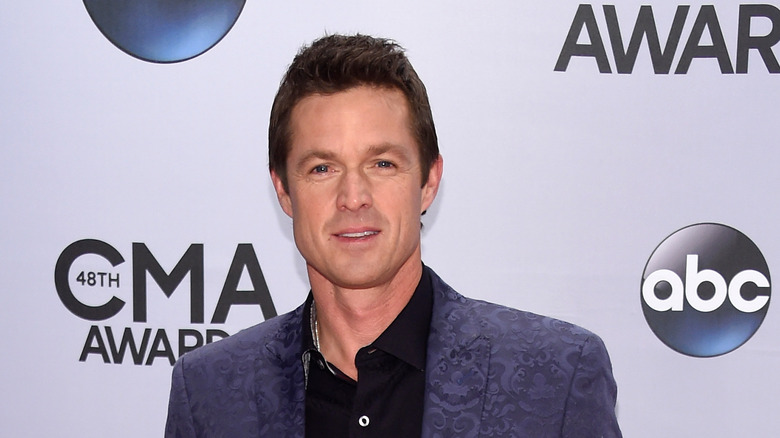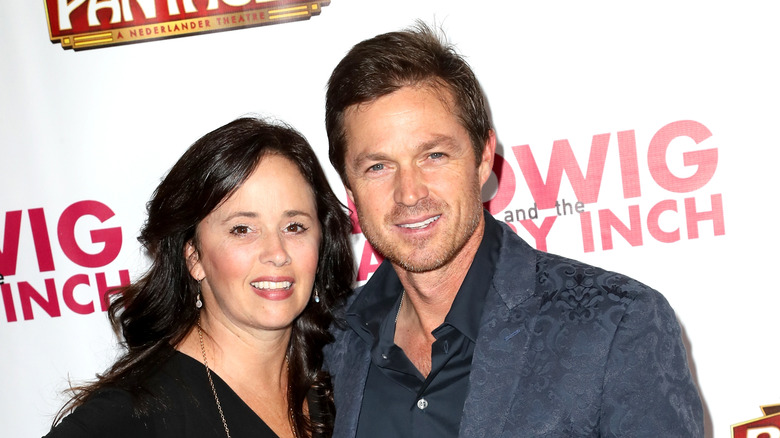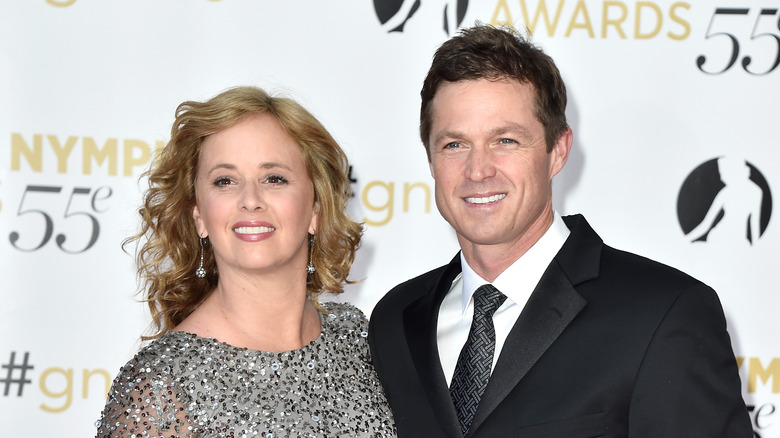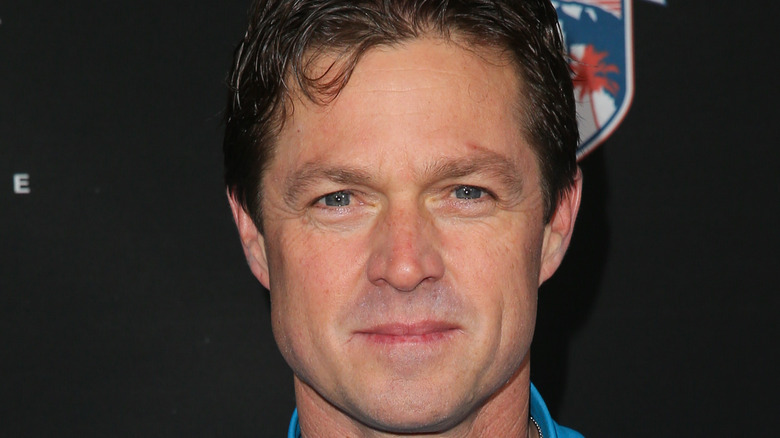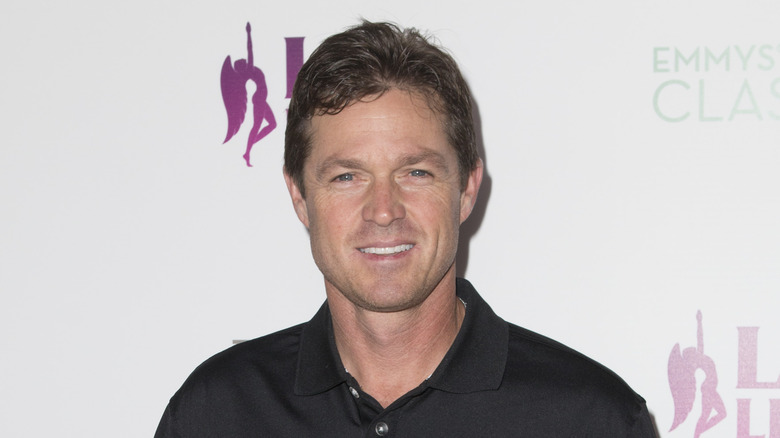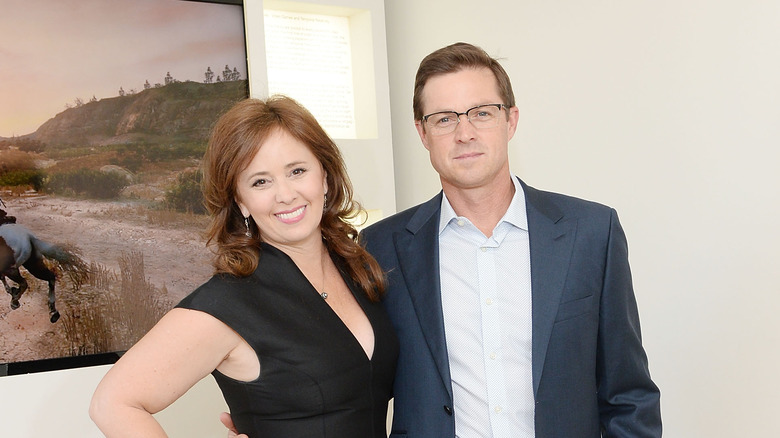Eric Close Discusses Starring In The Mulligan, Life In A Pandemic, And More - Exclusive Interview
What do "The Magnificent Seven," "Without a Trace," and "Nashville" have in common? Eric Close, the Golden Globe nominated actor with more than two decades of experience in the entertainment industry. Close is not just a dedicated family man with a fulfilling life both on and off the screen — he is a storied entertainer with credits such as "American Sniper" and Amazon's "Legal Action" under his belt, and it's no surprise why Hollywood keeps calling him back. The actor is dedicated, positive, balanced, and devoted to a positive work environment for actors and crew alike. This isn't as common in the industry as you'd think, and we got an even closer look at the actor's new film, "The Mulligan," during an exclusive sit down with Close himself.
Close joined us from his home in Oregon, having left Los Angeles for the quiet life and access to the great outdoors amid the COVID-19 pandemic. Speaking about his children, his faith, and his desire to balance his life both professionally and personally, Close didn't hold back about his new project, "The Mulligan," nor about his life as an actor and director. Having worked with the likes of Kristin Chenoweth and Scott Wolf, Bradley Cooper and Connie Britton, Close is no stranger to life in the Hollywood fast lane — but he has a calm, nurturing presence that is only obtainable when the ideal work/life balance has been achieved. From his inspiration behind "The Mulligan," to the lessons he's learned throughout his career and his professional experience as both an actor and a director, here's what Close revealed about his journey throughout the business.
This is what attracted Eric Close to The Mulligan
Let's start with chatting about the movie, "The Mulligan." It's a story about hope, redemption, forgiveness. With that in mind, what was it that struck you about the project and then motivated to really add your name to it?
I'll tell you a little backstory about it. I was doing a movie in Toccoa, Georgia a few years ago, and one of the guys that was working on the movie, Rodney Eldridge, he and I were playing golf together. He's been working on the production side. He's one of the producers. As we were golfing, because I love the game of golf, it's one of my great passions in life, he said, "My dad, Rick, he's developing a movie about golf and it's a Christian film, but it has..." As soon as I heard golf and Christian film, I'm like, "Ooh, that sounds cool," and I said, "Well, look, if it ever gets to the place where it's going to be a go, let me know." Two years later, Rick called and said, "Hey, we would like to know if you'd be interested in playing the lead in this movie, 'The Mulligan.'"
Oh my god, two years later. That's amazing.
Yeah, two years later. I jumped at the opportunity. I read the script, and like those messages that you pointed out about hope, redemption, forgiveness, second chances, that message resonated with me because I think it's so important [along with] the element of having it revolve around the game of golf. One of the things I love about [golf] is it really resembles life in many ways. A lot of the things that happen in the game, it's like life. You may hit a really good shot and then ending up in a bad spot. You could be living a pretty good life and bad things can happen, or vice versa. Sometimes you see people who aren't living great lives and seem to be really blessed, so it's weird to think about.
There's rules that you got to follow, but what I love about this movie is, yeah, there's life rules that we have to follow and there's consequences for our actions, but when you put God in the equation, there's second chances. We have a second chance to make things right when our life gets turned upside down or we make poor choices.
How the game of golf impacted Eric Close's acting experience
I would imagine as well, that ... [golf] teaches quite a lot of patience, which is such an integral part of life, and it's a lesson I feel like not a lot of us learn until later on.
It's true. That's a great observation, the way you said that. Paul, the character in the movie, you see that he's got a big ego, a lot of pride, and he wants to be really good at the game of golf, but he's not a professional. A lot of us amateurs, especially when we have some skill, we're pretty good athletes, you expect yourself to be better. When you don't play to the level that you think you can play at, it's easy to get really frustrated. It's an incredibly frustrating game, but so is life, and you're right.
When I really started enjoying the game is when I focused more on the experience of being out there, doing the best I could, and looking around at how beautiful it was and going, "Wow, I'm really fortunate to be out here playing this game," and most importantly, spending time with my friends. I'm out there, fellowship, I meet new people, and when I took the pressure off of trying to be better at it ... I'm not a professional golfer. I play it for fun, and so when I lightened up, then I really enjoyed the game. Paul discovered that, amongst the many things he discovers in the film. Also, when Tom Lehman says to him, "Hey, Paul, you're not good enough to get that mad," it really plants that seed of, "Wow, I'm acting like a big baby in the movie." It can be a frustrating sport, no question.
Yeah, I can imagine. And I'm sure to source inspiration, what of your own experiences of forgiveness, relationships, etc., informed your creative process as you were embarking on this character?
Well, I think none of us are perfect. We all fall short in our life, in our journey, and that's the message of Christ, that he paid the price [and] we are forgiven for our shortcomings, our mistakes, our failures. A lot of people, especially when they're considering God and a relationship with God, they're like, "Well, why would God want anything to do with me? I'm no good," or, "I blew it too many times." That's the most amazing thing about the grace of God: "There's nothing you can do to miss out on my love for you," and that's an amazing promise. Humans, you can't put your trust in people because we fail each other.
I know my own life. Throughout my life, some of the choices I've made were poor choices, and getting a chance to know that there were consequences for those actions, but I'm thankful that I got a second chance. Even in relationships, I'm married, so there's times where you say things, you snap back when you shouldn't, and getting a chance to say, "Hey, I'm sorry," and then to hear the response, "It's okay," I'm forgiven, "just watch it next time, watch your tone," or whatever it is. I know people who've made some really big mistakes in life, and they've gotten second chances and turned their lives around, so that message really resonated a lot with me.
Eric Close reflects on the meaning of his new film
It's universal, but it's also incredibly personal, which is ... an interesting avenue to explore as an artist.
If you go around thinking you don't do anything wrong, then you need to check yourself ... This character of Paul McAllister in the film, when you watch the movie, you'll see a lot of things that he does. He's trying to live a decent life. I mean, he's honest, he really does love his family, and he thinks he's doing the right thing.
But a lot of times, when we think we're doing the right thing, people end up getting hurt by it, and this is a common theme that you'll see in the world, where people will pour their lives into their career at the sacrifice of their relationships or their health, right? They think, "Oh, I'm working really hard for the family," and the family will say, "Hey, you know what? I'd really like it if you were home more," or the son or daughter says, "I'd love it if you'd make it to my soccer games once in a while," or the wife saying, "Hey, I'd love to..." or husband, vice versa, "I'd love to go on a date with you."
On the surface, you can convince yourself, "I'm doing the right thing, I'm doing the right thing," but the other thing is that, sometimes, a big lesson that we all have to learn is, we're not in control and we think we are, and we try to control every aspect of our life, and I know in my own life that the more I've released and trusted, the better life has been. It doesn't mean things always work out the way you want them to, but when [they do] ... It's amazing.
I saw this thing online yesterday. This professor was holding this glass of water and he asked the class, "How much does this glass of water weigh?" The kids guessed eight ounces [or] 12 ounces, and he says, "Yeah, if I hold this right now, it feels like 12 ounces. If I hold it for an hour, my arm's going to start to get really tired, and if I hold it all day, my arm's going to get numb and I'll probably not be able to hold it." He says, "But as soon as I set that glass of water down, I'm freed of it," and he says, "Those are the burdens that, so often, we hold onto, that create anxiety and stress and depression," and so it's the same thing. There's these times where we have to surrender, let go, and ask for that second chance and go, "Can I just get a break here?"
[It's] that saying of, "The tighter you hold onto something, the more it will slip out of your grasp," so I'm sure that's the message a lot of people right now, especially with pandemic life, can relate to.
I'll be the first to tell you, I don't have it all figured out. As long as I'm on this side of heaven and I'm breathing, I'm learning, I'm growing. I'm still going to make stupid, boneheaded mistakes, but I'm great, and I'm thankful for grace and mercy, that I know I have a second chance, and yes, there are consequences for our actions. If I go out and drink and drive and crash my car, that's on me, and so there are consequences. Even then, if you survive it, there's a chance to make it right.
Eric Close reveals an interesting behind-the-scenes factoid
I want to talk to you a little bit about the production experience as well. The pandemic has made things incredibly difficult for Hollywood, difficult for film production, so were you delayed at all? How long were you filming for? Give me a little trip through the production experience.
Yeah, that's a great question. My hat's off to every industry, and because we're in Hollywood ... during the pandemic, I acted and I directed, so the experience for me as an actor was different. I had opportunities to take my mask off because I'm working in scenes and then everybody else was responsible [for] protecting their zones, and when I was directing, it was 24/7. When I was on set, I had a mask on. It was funny. I switched to one of those plastic shields, and so often, I'd forget it was there and I'd take a burrito to go eat and smash it into my mask, or the shield. That was an experience all in itself.
Everybody's on board, everybody's doing their best, they're trying to make it work. It's really difficult. I hope and pray that it goes back to the way it was, where we don't have to do that, but while we're in it, we got to be safe. On this particular movie ... When I first heard about the story, and then when I got asked to do it, it was two years, but then twice, we were geared up and ready to go, and then we had to stop and wait, so it took us another year until we actually shot the movie.
One of the coolest things about production was [that] about 60% of our crew were students from Liberty University. They were all juniors and they were the coolest kids, so eager and hungry and wanting to learn, and they got to bounce around from different jobs and parts of the movie, different departments. I got to meet them all and hang out with them, and ... Here I am, a guy who's been in the business for 30 years, and I was getting to live vicariously through them and remembering what it was like when I was in college, going, "Man, I want to be a part of this business." That was pretty fun, and they were a great group of kids, and they worked really hard because they wanted to do a good job and learn.
This morning on-set practice stood out to Eric Close while filming The Mulligan
This goes hand in hand, but is there a moment of the production experience behind the scenes that really stands out to you?
[A] couple of things. Every morning before we started production, everybody would gather on set and someone would lead a prayer. How often do you see that on a TV show or a movie where everybody collectively ... there were people on there that aren't people of faith, and it wasn't putting pressure on anybody. It was like, "Hey, if you want to join us, we're going to pray for the day and ask God to watch over us, protect us, help us do the best job we can," and it was such a beautiful set. Everybody got along great. Everybody treated each other with kindness. No one got really upset about anything. If they did, it was like, everybody's chilled out. It was a great way to start the day.
The other thing — it was our last shot of the movie and I was playing some pretty good golf on the movie, so they were probably a little overly confident in my swing at this point, thinking, "Oh, we need to get Eric to do this really cool shot, and Pat Boone will be standing next to him out in the fairway." They wanted me to hit a little short chip shot, maybe 50 yards to the green, and then spit it down to the hole, and I'm going, "Well, that's asking a lot, but I'll go for it." I think they rolled that camera for probably half an hour and I kept messing up. I was choking the ground. I was sweating. I was so embarrassed. I remember thinking, "What is going on? I've been playing some pretty good..." It was really embarrassing.
Finally, I hit a decent shot and they go, "All right, I think we got it." We go up to the green, and we're all gathered around, and Pat Boone is dressed in his cool outfit that he wore — I think they're called plus fours, the pants he wears, and the tam o' shanter hat. He had this old wooden putter, and he sets a ball down, and he hits it with this old putter and makes this amazing putt and everybody cheers. That was like the great cap on the movie, that's a rap, and it was a wonderful moment to see this 87-year-old guy who is full of life, to cap it off with this great putt. That was a great moment.
What does Eric Close want viewers of The Mulligan to take with them?
What are you really hoping viewers will take away from the film? They can go see it in the theaters. Is it a big screen experience? Can it be watched from the living room? What are you really hoping people will gather from it, from both settings?
As far as the big screen, and I'm sure you feel the same way, I love the big screen. I love seeing a movie that is meant to be on the big screen. Now, there are movies and, obviously, TV shows, but there are films you can watch on your TV and — it's really just story and it's not as much about the big, grand cinematography, if you will. In this movie, there are these amazing vistas out on the golf course and the scenery of Georgia that are overwhelming and beautiful on the big screen. I always think, "God, it's great to see a movie like that on a bigger screen."
What I'm excited about, as we've started to come out of this pandemic, it's not feeling like such a big threat ... This is a family movie, so people can take their family and say, "Hey, let's go to the movies, get some popcorn and see a great movie that we can all see together as a family." You're not covering your kids' eyes in the movie because there's nothing gratuitous, and there's a great message about relationships between parents and their kids and husbands and wives and friends, but really, about healing relationships. I hope that, one, people are entertained. I think that they go and if they like golf, that'll be fun, they can make fun of my swing. There's a couple of really cool cameos in the movie. Some people did us a favor and came and did this [film], really cool, high-profile people, friends of ours.
I really do hope that if people see this movie ... They may be questioning in their life, do I really deserve a second chance? And this movie will say to them, "You do, it's there for you." So maybe they're struggling in their marriage, or relationship with their kid, or a friendship, or an addiction, whatever it is in their life, feeling low. The pandemic ... It's been hard on a lot of people. I've seen more hardship during this last two years, and loss. There's been a lot of loss. I mean, I lost my brother four months ago. It may not because you did anything wrong. It may be where you are right now. A lot of people have been isolated.
Eric Close gives insight into his pandemic experience
It's such a collective grief as well. I think a lot of us are starting to really feel it two years in. At first, it was the fight or flight instinct kicking in, and I recently did a story about pandemic fatigue, and it's real, the burnout is... People are feeling it. It's a unique experience that none of us really could have predicted.
No, and bringing that up, that pandemic fatigue, I said earlier, where we're not in control, what an opportunity for people to go, "Wow, I don't have any control," and to really look to God and say, "I'm tired, I'm full of fatigue and grief, and I need a break, I need some peace in my life." That's the only place you're going to really find true peace. Maybe the blessing that comes out of this pandemic is that people do really take stock of their life and go, "Wow, what's really important? What really important? Is it money? Is it my relationship with my family, my friends, my health? What's important, my relationship with God?" That's really important.
I don't know that you necessarily go to a movie and [then] your life is transformed overnight, but it plants seeds. I've seen wonderful movies, even films that aren't Christian films, [where] I love the message, and it really resonates with me and makes me think about life. I hope that people can go with their families or their friends and afterwards, they're sitting over a meal or whatever, and talk about it and say, "Hey, how'd you feel about that story and that message?"
What would you say your biggest takeaway from the project would be?
That I can still act [laughs]. I love coming off of a project and knowing that I've made some lifelong friends ... I've done a lot of projects in 30 years, but what I really feel good about is that this movie also has a message to it that could ... Even if it impacts one person's life, if one person out of a million people that see this, their life changes because of it, and the odds are, it's going to be more than one person that's going to be affected by this story, but I can look back on my career knowing that I will feel very honored to have been a part of this movie, "The Mulligan."
I'll tell you something really cool. The guy who co-wrote this book, Wally Armstrong... He wrote it with Ken Blanchard. I met Wally ... almost 30 years ago, I met him at a Christian golf event, like a men's fellowship where guys get together, they play golf, they talk about Jesus, and support each other and encourage each other. It's like a big men's Bible study, I guess.
It's a crossover.
Yeah, it's cool and it's fun. They call it the Midwest Fellowship. Anyway, I met Wally, [a] really fun, super charismatic, loves life guy. Well, several years after I met him, I was in England ... I was there. My family was with me, and it gets light at four o'clock in the morning, so I snuck away to go play golf because my family was still sleeping. I got to this golf course and no one was there because it was 4:30 in the morning, but it was light, so I thought, well, I'll play and then I'll pay when they open up.
I went around twice. I played 36 holes of golf. They finally opened up, I went into the pro shop, and the guy is like, "Oh, you want to play some golf?" I said, "I already played 36." He says, "You've got to be kidding. What time did you get here?" I said, "4:30." We strike up a conversation. He says, "I know one person in the United States," this is because I'm in England, and I said, "Really?" He goes, "Yes, a guy named Wally Armstrong." I go, "You got to be kidding me."
Eric Close reveals what lessons he's learned throughout his career
We've talked a good chunk about the film. I'd love to know a little bit more about your career outside of the film. I know you've had arcs on "Nashville," you've been in feature films. What stands out to you as a learning or a challenging experience that you've had, maybe both TV, and then on the film side as well?
I think one of the greatest lessons I've learned in our industry is, don't be afraid to ask for what you want to do or tell people what you want to do. You mentioned a story about your granddad sweeping up film clips on the floor, and I think that you have to be willing ... to pay your dues. Don't expect to be an overnight success because part of that process of getting better at what you do is learning as you go, learning from those around you, asking questions.
If you have goals, tell people about them. To give you an example, this is more on the directing side, but I always wanted to direct right when I got started in the business. That was a high priority for me, but clearly, God had other plans and my acting career took off and I saw that that was the direction I needed to go, and so I did, but I never gave up on it, so I always asked. Anytime I was a lead on a show, I would tell the show runner, "I really want to direct if this show takes off." I got onto "Without a Trace." That show ran for seven years, and I did everything I could from day one to show them I was serious. I shadowed directors, I hung out in the editing room, I stayed late at night after I was done shooting my scenes and hung out with directors. I asked a lot of questions and kept pushing, and I kept getting told, "No, they're not going to let any actors direct. [No] actors are going to direct."
Finally, I got my break, and I was the first actor on any Jerry Bruckheimer television production that was allowed to direct, and it opened that ceiling for other actors to do it, and then they started to say, "Hey, these actors actually can do it." I was terrified once they said, "Okay, here's the reins." That was another lesson I learned — what seems to be so scary, really isn't. You got to go for it. The big lesson was, "If you have a goal, tell people." Don't stay quiet and stay in this job that you're miserable in. If you get your foot in the door and you're sweeping film clips, but tell people, "Hey, I really want to be an editor," or, "I want to be an entertainment journalist" and let them know, because otherwise, people really aren't going to help you because they don't know. If you tell them, they go, "Oh, hey." You have to be persistent without being absolutely annoying or showing up at people's houses and going, "Hey, I really want to work for you." It's not cool. That was a great lesson.
Eric Close shares his thoughts on perfectionism within Hollywood
You try to do your best, but at a certain point, you got to say, "That's good enough." Oftentimes, because there is no "perfect" in what we do, and a lot of times, people, they push to try and make it perfect. You'll hear about these directors that'll do 80 or 90 takes of something. I have a friend who worked with a very famous person and actor and then director. This director had this friend of mine, who's a well-known actor, do one line 88 times.
I worked with Clint Eastwood, and Clint does maybe two takes. Clint, he'll shoot the rehearsal. There's no rehearsals. You come, ready to shoot, so they set up the cameras and the lights and then do it, and if he's happy with it on the first take, move on. What Clint learned early on was, you know what, you have so many other resources that are involved in the storytelling. You have editing. You're going to add in sound and music and all these other things, and so I think he realized that it's never going to be perfect.
I mean, people end up overworking themselves and these long, long hours. What I don't like ... we've swung the other way in the business and we're trying to cram too much into a short amount of time, which I think is the same negative effect as if you're working 20 hours a day. I think you have to find, again, we're talking about balance, finding a balance where people can go home, and they're not driving home and falling asleep at the wheel, but at the same time, they're not being expected to cram an unrealistic amount of work into a limited amount of time. That, I think, is irresponsible as well.
Working in creativity and creative avenues, it takes a certain amount of organic time to get there as well. It's not a process that can be zoomed through as much as it can't be a process that can happen when your entire team is exhausted either.
Trust me, it is painful when you are moving as fast as you can and you're still being told, "You're not going fast enough," and you're thinking, "I'm not doing 88 takes, I'm doing two takes, maybe three."
Anyway, I get it. As a producer, I know you've got your budget and everything. Those are a couple of lessons, but the biggest one is, just ask. I mean, if you're going into an industry... And also, be willing to just get your foot in the door. If you're running coffee for a writer and you want to be a writer, run that coffee as good as you can for that person, and then tell them, and then, every once in a while, you're going to get a little bit of... Maybe you can say, "Hey, can I take you to coffee," or, "Can I take you to lunch," and you take the lead writer to lunch and pick their brain and say, "How did you start out? How did you get your foot in the door? What was your big break?" And then they see that you're eager, and then they might say, "Hey, do you have any writing samples I can take a look at?" "Yeah, actually, I do."
Does Eric Close prefer acting or directing?
You've mentioned the directing was what you initially wanted to do. Is there still one that you prefer over the other, or are you grateful that you have had your feet in both positions?
I'm glad to do both. I didn't get a film degree, but I was taking film classes at USC while I was there, and one of the things I loved about it is, I wanted to absorb everything, learning, so I was a boom operator, I was a dolly grip. I would go into the editing room and work with the cutting and splicing of film. One of the most stressful jobs was a being a film loader because you're given the exposed film that's been shot and then you have to change it and put it in these canisters to send out, to be processed, and you're so stressed that you can't let any light into that canister to ruin all the dailies.
I love every aspect of the business. Directing is less performance anxiety. When you're acting, your face is on camera, it's your performance, so that's got its own level of stress, remembering your lines, all that stuff. Directing is, you're wearing a lot of different hats, you're working with the department heads and everybody. I love the collaboration. I love the pre-production process, going on scouts, talking with the department heads about costumes, props, all that stuff. It's great for my brain, which loves to have all that stuff firing at me all at once. That, I love.
The thing about acting that's great is, you have this concentrated amount of time where you're super focused, you're working really intensely, and then you get this break and you either go home or you've got some down time in your trailer to regroup for your next scene or whatever. People don't understand, they'll see a movie and there's these really intense scenes, and they don't realize you may be doing that scene for hours ... Every take, you have to do it. You have to somehow get to that same place emotionally and physically.
It's incredibly taxing, but that's what we're expected to do as an actor. It's really important to, whatever aspect of the business you're in ... You talked about taking the whole month of June to rest. It's important to get your rest. It's important to take care of that yourself.
Eric Close reveals how his acting process has changed over time
You asked about lessons I've learned. Another one came to mind. That was the late JT Walsh. He was in "A Few Good Men" and he was a great character actor. He and I did a TV series together. I remember there was this intense scene where we were in this parking garage and I was driving, we were going to race down the parking garage, and it was really an intense moment. He's goofing off in the car and laughing and getting on the walkie, talking and messing around. I'm all focused ... I'm like, "Okay, I got to be ready for the scene," and I looked over to him and I said, "JT, do you always..." I said, "Man, you're always screwing around." I said, "Did Marlon Brando and Jack Nicholson, do they..."
Because he'd worked with both of them, I go, "Do they do this kind of stuff?" And he says, "Oh, yeah, they're always goofing off, and laughing, and then the director calls, 'Action,' and they're right there," and I said, "Really?" He says, "Look." He says, "Eric." I started late in my career. I really took off at around age 36, and he said, "I was the same way. I was so focused all the time," and he said, "I would waste all this energy doing the scene before the camera even rolled." He said, "I was so in my head about the scene, 'I'm going to do it, I'm going to' ... and I had all this energy and then they go, 'Action,' and I was drained." He goes, "What I learned to do is, do your homework, be prepared, then let it go. It's there, and when they call, 'Action,' you're going to be in the moment."
Granted, there are times you need to be focused. You don't want distractions, so you may go to a quiet place or really get into that place you need to be for the scene. I understand that. What he was saying is, don't waste it all before the cameras are rolling, and it's the same thing with directing. Do your homework, be really prepared, and then, when you start rolling camera, you know what you want, you know the shots you really need to get, and then you've got some gravy shots that you think, "Okay, if we have enough time, let's try that," or something may pop into your mind and go, "Oh, hey, let's try this."
It's like you said, we're talking about spontaneity in an interview, but all of a sudden, a creative idea will come to you, or your DP will have a great idea, or even a PA. I've had PAs say to me, "I don't want to overstep my bounds here." I'm like, "No, no. Great idea. Joey came up with a really cool idea. Let's do that." I remember on this last movie I directed, one of the guys, I remember the department he was in, he had this awesome idea, and I called him out during a meeting and said, "Hey, just want to say that so and so had this..." You should have seen this guy. It was like he got an Oscar or something because he was acknowledged in front of the whole crew for having a cool idea, and that goes a long way because I think it built some confidence, and you got to give credit where credit is due.
"The Mulligan" will premiere in cinemas nationwide for two nights only on April 18 and 19. For more information on getting tickets, visit themulliganmovie.com.
